|
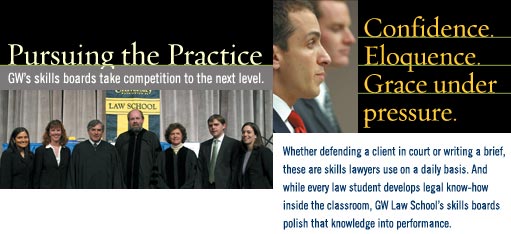
Photo on left: Van Vleck winners Rupali Patel and Stephanie Roy with judges Stephen H. Glickman, District of Columbia Court of Appeals; Frank H. Easterbrook, U.S. Court of Appeals for the Seventh Circuit; and Collen McMahon, U.S. District Court for the Southern District of New York; and participants Michael Patrick and Effie Aquila.
Photo on right: Second-year student Ron Chester represented the state in the finals.
By Laura Ewald
Photos by Abdul el-Tayef/wppi
Now more than ever, the Law School is investing in its student-run organizations and in its skills-focused foundation classes by providing them with new offices, moot court and mock trial rooms, class space, and by offering more credits for skills classes. The results are promising—GW is rapidly growing as a player on the national competition scene by excelling in moot court, mock trial, and alternative dispute resolution competitions. Skills boards practice sessions and competitions—often coached or judged by faculty members and GW Law alumni—help the students build connections with professionals they admire. By challenging their minds and abilities through the preparation process and the competitions themselves, the skills boards get students out of the classroom and into the fire.
Moot Court
Assistant Dean for Student Affairs David Johnson, who serves as decanal adviser to all the skills boards, says he continually encourages student participation in the boards and corresponding classes because of their long-term benefits.
“I’m a huge fan of ‘doing’ in law school. Students spend so much time being ‘talked at’ in the classroom,” he says. “I always tell them to go out and do what you’re learning about. We’re in Washington; we’re in the law city, take advantage of that. No one will ask you to take a test when you’re a lawyer. But they will ask you to use your oral and written skills every single day—inside the courtroom and out.”
Like the other skills boards, the Moot Court Board is an honor society with membership based on exceptional performance in internal and external competitions. Focused on promoting oral and written advocacy skills, the Moot Court Board prepares students for the rigors of making presentations and arguments in the appellate courts. From studying a case to designing oral arguments to writing a brief to answering rapid-fire questions from a panel of judges, board members sharpen their skills in an intense and competitive arena.
Former Associate Professor of Legal Research and Writing Lorri Unumb, who served as director of the Legal Research and Writing Program and who coached some students preparing for moot court competitions, says many students benefit as much from the preparation process as the competitions themselves.
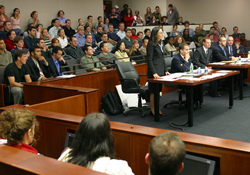
Second-year student Sogand Zamani and fellow participants make opening statements to the judge and jury as a packed audience looks on.
|
“They love the journey they have to take to get to the competitions,” Unumb says. “During the practice period, they work closely with professors who grill them and peers who encourage them. It’s a great learning opportunity just to prepare as well as to participate in the events.”
The journey consists of developing a team of students who study a case, write a brief, and prepare an oral presentation. Students rely on faculty coaches—such as Professor Todd Peterson, who guided this year’s American Bar Association competition team—for feedback and assistance in securing additional faculty members to critique their work. A series of practice rounds are led by peers and professors who evaluate the students’ performances and ask question after question to sharpen their arguments.
All this leads to the internal and external competitions. Each year, the board sponsors the Van Vleck Appellate Moot Court Competition in Constitutional Law, the Jessup Competition in International Law, the Giles S. Rich Competition in Intellectual Property Law, and the McKenna Long & Aldridge Gilbert A. Cuneo Government Contracts Moot Court Competition. In alternate years, the board hosts the interscholastic National Security Law Competition. The board and the Law School recruit notable guest judges for the competitions, such as Frank H. Easterbrook of the U.S. Court of Appeals for the Seventh Circuit for this year’s Van Vleck competition.
These events are an opportunity to highlight the Law School as well as the talents of the students. Focal points of the Law School’s facilities expansion are the three new moot court and mock trial rooms. Touch-screen computer and video monitors, master control panels, video cameras, realistic trial settings, and ample audience space have improved the spaces “more than 100-fold,” Johnson says. “The new rooms are a beautiful example of the Law School’s investment in the skills boards.”
The Moot Court Board also enjoys a new office space that is four times the size of its previous home, with ample room to work complete with new desks and supplies. Taking advantage of their new home base, improved competition, and practice rooms, members are striving to improve their performance in external competitions as well as the events GW hosts.
“We’re making great strides in interscholastic competition,” Unumb says. “It’s a very exciting time for the Law School to see these students take the initiative to represent GW so well on the national scene. It’s also a personally rewarding experience for the students themselves—their family members and friends attend the competitions, and the students gain a sense of personal achievement for their efforts.”
Board members select students to represent GW Law at several interscholastic competitions. GW met with national success this academic year when Kristin Hird and Jake Kramer won the Thomas Tang Regionals in Nashville as well as best brief in the competition and advanced to the nationals in Hawaii where they reached the semifinal round. Ann O’Connell and Adrienne Rosen advanced to the quarter-finals of the San Diego Criminal Procedure Tournament in the fall. This spring, Elizabeth Koniers won “best oralist” at the National Environmental Moot Court Competition.
Participating in competitions at GW and across the United States helps students such as Moot Court Board President Lori Kenemuth excel not only during their time at the Law School, but also in their future practices.
“Participating in Moot Court Board has helped me further develop critical skills that will help me later in my career,” Kenemuth says. “Oral advocacy competitions have increased my confidence as a public speaker. As president of the board, I have gained essential experience in project management. I have learned the importance of setting timelines and deadlines. I was also given the opportunity to work with my peers and the Law School administration, and was able to work with people of various personality types toward achieving a common goal.”
Mock Trial
Through practice sessions and competitions, the Mock Trial Board brings the courtroom to life for its members. Dedicated to excellence in trial advocacy, the board conducts intrascholastic trial competitions, which are held in the new, state-of-the art trial rooms on campus and in the D.C. Superior Court. Judged by practicing litigators—often GW alumni—student litigators are challenged to use their research and investigative skills as well as their presentation ability in the competitions.
Participants get hands-on experience with direct and cross-examination of a witness, presenting and interpreting evidence, courtroom etiquette, making objections, and connecting with a jury. “They learn the unpredictability, the human element of the trial courtroom. Essentially, they learn how to tell a story—how to back that story up with evidence, how to control how the story is told, and how to cast that story in their client’s favor,” Johnson says.
Members of the Mock Trial Board represent the Law School at interscholastic competitions across the nation. The Law School has achieved national recognition based on the success of Mock Trial Board members in these competitions.
This academic year, members excelled in internal and external competitions. They hosted the first annual Cohen & Cohen Mock Trial Competition at GW and won the American Trial Association’s Regional Competition in Washington, placing among the top teams in the nationals of that competition. They also finished first at the Thurgood Marshall Regional Trial Court Competition in Virginia Beach, Va., and advanced to the national round of that competition in Boston.
Ann O’Connell, a third-year student, says time spent on the board complements her coursework within the Law School.
“GW Law offers opportunities to learn the critical disciplines like negotiations, trial advocacy, and advanced appellate advocacy,” she says. “The skills boards, however, are a great opportunity for students who want to concentrate on taking classes that cover bar exam material yet still want to develop critical litigation skills.”
Alternative Dispute Resolution
Honing skills in the growing field of dispute resolution, the ADR Board sponsors in-house competitions in negotiations, mediation, and client counseling. Participation helps students learn about different ways to resolve disputes out of court. Members are challenged to broaden their interpersonal communication, fact-gathering, and ethical skills. The board also prepares students to compete interscholastically at the regional and national level. ADR hosts speakers from government agencies and the judicial system, as well as local practitioners, to expose the Law School community to a wide range of ADR topics.
In the spring, two GW teams participatd in the ABA Client Counseling Competition Regionals, and one team—Sarah Bannister and Sonia Wadhwa—advanced to the nationals. In recent years, GW has been a strong presence in ADR competitions. The first place winner of the ABA regionals traditionally plays host to the event the next year, as GW did in 2003 after winning the regionals in both the client counseling and mediation disciplines in 2002, with several alumni volunteering as judges.
Also a member of the ADR Board, O’Connell says many of her peers participate in ADR and other skills boards to increase their visibility within the Law School and to strengthen their careers.
“Students generally participate in ADR and other programs as a way to get involved and distinguish themselves from the masses, and I think they are surprised by how much they learn and develop their knowledge through participation,” she says.
Johnson stressed all students—no matter their concentration—benefit from the dedication they put into their participation, the ties they forge with faculty members and alumni, and the rewards that come from competition.
“The number one major gain of getting involved with the skills boards is that every lawyer has to make presentations—not just litigators—every lawyer needs to present him or herself with confidence and authority, on paper or in person,” Johnson says. “To demonstrate those qualities in competition against your peers is spectacular.”
|
The final round of this year’s McKenna Long & Aldridge “Gilbert A. Cuneo” Government Contracts Moot Court was held April 15 at the Howard T. Markey National Courts Building in Washington. A reception followed at offices of McKenna Long & Aldridge. The annual competition awards at least $1,500 in prize money and holds its final round in the U.S. Court of Federal Claims.
|
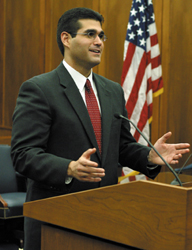 |
Best Oralist winner Alain Lopez
|
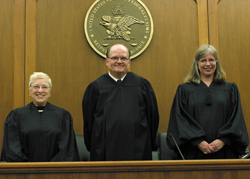 |
Finals Judges Ruth C. Burg, George Miller, and Candida Steele
|
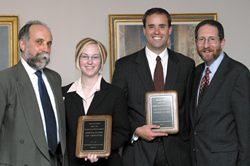 |
Reception Master of Ceremonies David Kasanow of McKenna Long & Aldridge; winning team Jessica Clark and Jay Griffiths; and Professor Steve Schooner
|
Back to top | Summer 2004 Table of Contents
|